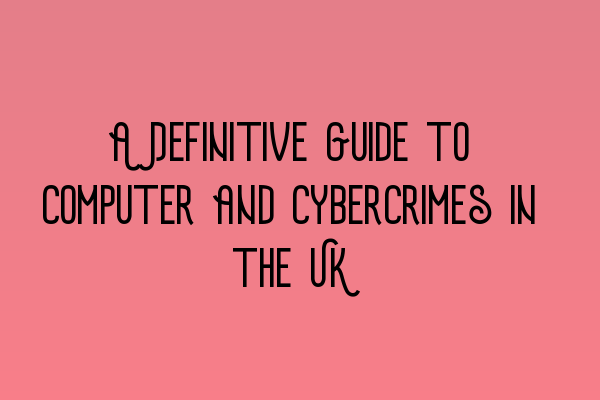A Definitive Guide to Computer and Cybercrimes in the UK
Welcome to the definitive guide on computer and cybercrimes in the UK. As technology continues to advance, so do the methods used by criminals to exploit it. This guide aims to provide you with a comprehensive understanding of computer and cybercrimes, their legal implications, and how to protect yourself against them.
Understanding Computer and Cybercrimes
Computer and cybercrimes refer to illegal activities that are carried out using digital devices and the internet. These crimes encompass various forms, including hacking, identity theft, fraud, data breaches, phishing, and more. Criminals exploit vulnerabilities in computer systems and networks to gain unauthorized access, steal sensitive information, and cause financial or reputational harm to individuals and organizations.
To combat these crimes effectively, it is essential to understand the different types of computer and cybercrimes:
Hacking
Hacking involves gaining unauthorized access to computer systems or networks to disrupt operations, steal information or cause damage. Common examples include hacking into databases, government systems, or personal devices.
Identity Theft
Identity theft occurs when someone obtains personal information, such as social security numbers, bank account details, or passwords, to impersonate the victim or gain financial benefits.
Fraud
Fraud refers to the intentional deception or misrepresentation to gain unlawful benefits. In the digital world, this can include online scams, fake websites, or fraudulent emails designed to trick individuals into revealing sensitive information.
Data Breaches
Data breaches involve unauthorized access to sensitive data held by organizations, leading to potential leak or misuse of personal information. These breaches are often a result of weak security measures or targeted attacks.
Phishing
Phishing involves tricking individuals into revealing their personal information, such as passwords or credit card details, by impersonating trustworthy entities through email, text messages, or fake websites.
Protecting Yourself Against Computer and Cybercrimes
Given the increasing prevalence of computer and cybercrimes, it is crucial to take proactive measures to protect yourself:
Use Strong and Unique Passwords
Creating strong and unique passwords for each online account is essential. Utilize a combination of letters, numbers, and symbols to enhance the security of your passwords. It is also advisable to use password management tools to securely store and generate passwords.
Enable Two-Factor Authentication
Two-factor authentication adds an extra layer of security to your accounts by requiring an additional verification step, often through a text message or authentication app. This can prevent unauthorized access even if your password is compromised.
Stay Vigilant Against Phishing Attempts
Be cautious when providing personal information online, especially if you receive unsolicited emails, messages, or requests. Verify the authenticity of the sender and ensure the website has a secure connection (look for ‘https’ in the URL).
Keep Software Up-to-Date
Regularly update your software and devices to protect against potential vulnerabilities. Using outdated software increases the risk of exploitation by cybercriminals.
Utilize Antivirus and Firewall Software
Invest in reputable antivirus and firewall software to detect and defend against malicious software or unauthorized access attempts.
For more in-depth information on how to protect yourself from computer and cybercrimes, check out the related articles below:
- SQE 1 Practice Exam Questions
- SQE 1 Practice Mocks FLK1 FLK2
- SQE 2 Preparation Courses
- SQE 1 Preparation Courses
- SRA SQE Exam Dates
By staying informed and implementing best practices, you can significantly reduce the risk of falling victim to computer and cybercrimes. Remember, prevention is the best defense against these evolving threats.
